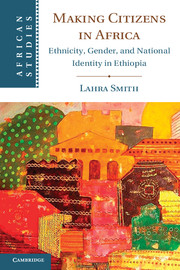Book contents
- Frontmatter
- Contents
- Maps and Tables
- Acknowledgments
- Abbreviations
- Glossary
- Maps
- Introduction
- The Challenge
- 1 Comparative Perspectives on Citizen Creation in Africa
- 2 The Historical Context for Modern Ethiopian Citizenship
- The Response
- Appendix I Methodology
- Appendix II Questionnaire for Parents and Community Members (English)
- Appendix III Questionnaire for School Directors
- Appendix IV Questionnaire for Teachers
- Bibliography
- Index
1 - Comparative Perspectives on Citizen Creation in Africa
Published online by Cambridge University Press: 05 May 2013
- Frontmatter
- Contents
- Maps and Tables
- Acknowledgments
- Abbreviations
- Glossary
- Maps
- Introduction
- The Challenge
- 1 Comparative Perspectives on Citizen Creation in Africa
- 2 The Historical Context for Modern Ethiopian Citizenship
- The Response
- Appendix I Methodology
- Appendix II Questionnaire for Parents and Community Members (English)
- Appendix III Questionnaire for School Directors
- Appendix IV Questionnaire for Teachers
- Bibliography
- Index
Summary
The study of citizenship is as old as the ancient Greek philosophers, but we have seen a resurgence of focus on citizenship in western democracies as new challenges confront relatively stable and institutionalized democratic states. Key among these are globalization and migration, the power of markets in shaping political and economic life, and a constellation of security threats, both real and perceived – as well as the various actors implicated in each of these, including the state, groupings of citizens, and noncitizens residing within the state. This scholarship provides a rich and nuanced terrain on which to consider the modern manifestations of citizenship and the contestations over its expansion. Somewhat surprisingly, however, the analytical lens of citizenship has rarely been deployed in many parts of the developing world. This is problematic for a number of reasons, not the least of which being that challenges of citizenship in postcolonial contexts such as sub-Saharan Africa are distinct from those in the western liberal democracies with relatively defined political boundaries, developed capitalist economies, and political and social traditions of individualism and autonomy. It has also resulted in the primary focus on formal politics that are of limited usefulness in explaining contemporary political and social dynamics in Africa.
That does not mean that the discourse on citizenship in the west has no relevance to places such as Ethiopia or other parts of Africa, which are the focus of this study. Based on its relatively recent decolonization, its distinct cultural traditions, and its persistent authoritarian political traditions, the political, historical, and social context for African citizenship may be divergent from the west. But the framing of citizenship as a “set of mutual, contested claims between agents of states and members of socially-constructed categories” has tremendous explanatory power in analyzing some of the most intractable and critical moral and political debates on the African continent.
- Type
- Chapter
- Information
- Making Citizens in AfricaEthnicity, Gender, and National Identity in Ethiopia, pp. 19 - 43Publisher: Cambridge University PressPrint publication year: 2013

